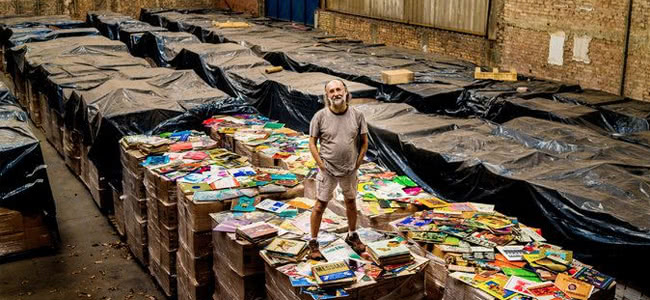Remember Paul Mawhinney, the Pittsburgh resident who was trying to sell one of the world’s biggest vinyl collections but couldn’t find a buyer?
Well, Mawhinney’s sad tale finally had a happy ending.
His 3 million plus collection of vintage records, dubbed ‘The Archive’, was eventually shipped off via a convoy of eight semitrailers to their new home in a 7,620 square metre warehouse in São Paolo after being sold to a man on a mission to own all the records in the world.
Introducing Zero Freitas, a 62-year-old Brazilian bus line magnate who has used his fortunes to feed a life-long vinyl buying compulsion to build the world’s biggest record library.
As a fascinating profile by The New York Times details, Freitas’ collection is so large that he can only estimate that he owns “several million albums,” even employing a team of college interns to catalogue and sort through his gargantuan assortment of LPs.
Freitas also has a network of international scouts who negotiate the acquisition of record collections the world over, from the inventories of defunct music stores and record labels to private collectors.
[include_post id=”338457″]
Love Music?
Get your daily dose of metal, rock, indie, pop, and everything else in between.
“I’ve gone to therapy for 40 years to try to explain this to myself,” Freitas tells the Times of his obsession, which began when he was child. By the time he was a teenager, he owned 3,000 records. Freitas reached ten times that number by the time he was 30 and took over his family’s private bus line company. When he was nearly 40, his compulsion had let to the dissolution of his marriage, meaning growing his vinyl library became his number one priority besides his business.
In recent years however, Freitas has gone on a veritable spending spree, shipping in an avalanche of titles that the aforementioned team of a dozen interns catalogue (by artist, title, release, and label), working through around 500 LPs a day. Compared to the rate at which Freitas’ vast collection is growing however, the sorting seems like a fruitless job; as The Times writes:
Between June and November of last year, more than a dozen 40-foot-long shipping containers arrived, each holding more than 100,000 newly purchased records. Though the warehouse was originally the home of his second business — a company that provides sound and lighting systems for rock concerts and other big events — these days the sound boards and light booms are far outnumbered by the vinyl.
Among his treasure trove is 100,000 records from Cuba – which is estimated to be about every single album ever recorded in the country. Significant given that up to a reported 80% of mid-20th century music from Cuba (along with countries like Brazil and Nigeria) has not made the leap from the vintage format onto new media, meaning that if the LPs disappear – so too does the music.
It’s this latter issue that has in recent years seen Freitas’ record fixation transform from that of an epic-scale hobbyist into a noble quest to preserve a whole history’s of music, no matter how obscure. An epiphany reached after an exchange in 2012 with New York music archivist, Bob George, who told Freitas: “What’s the good of having it [all], if you can’t do something with it or share it?”
[include_post id=”414720″]
Freitas is now preparing what was a colossal private collection into what is likely the world’s biggest public archive, a venture called the Emporium Musical, even getting federal trade authorisation from the Brazilian government to import used records as he works towards registering his non-profit Emporium.
The rabid collectors’ dream is now to bring his library to life, envisaging a sprawling vinyl haven, with turntables and listening stations for visitors to enjoy a whole history’s worth of records, while duplicates (around 30% of Freitas’ archive) will be available to check out and take home.
Our big question now? We’re wondering if Zero Freitas has been in touch with one of Australia’s biggest vinyl obsessives: Perth’s Brad Miocevich, who custom-built a three-storey a house for his 30,000 collection of records.
(Photo: Sebastián Liste/Noor Source: The New York Times)

































